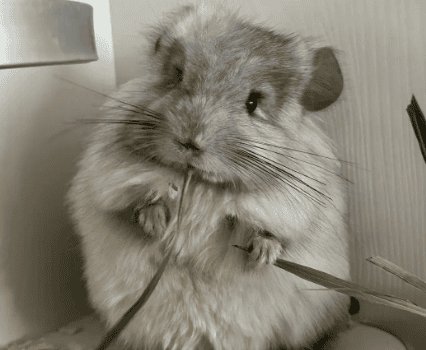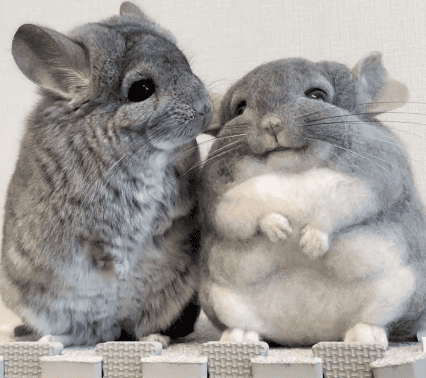Before you prepare to feed your chinchilla, you need to make the following preparations:
Cage: Choose a spacious, comfortable and safe cage. Chinchillas like to jump and climb, so the cage should be high enough, at least 60 cm. In addition, it is best to cover the bottom of the cage with absorbent matting material, such as sawdust, cat litter, etc., to facilitate cleaning and keeping it dry.
Food bowl and kettle: Food bowl and kettle are the basic equipment that chinchillas need every day. It is best to choose ceramic or metal food bowls to prevent chinchillas from chewing. For kettles, you should choose drip or ball-type kettles to ensure sufficient and clean water.
Hay and chinchilla food: The staple food of chinchillas is hay, such as Timothy grass and alfalfa. These hay should be stored in a dry, ventilated place to prevent moisture and mold. In addition, you also need to buy chinchilla food suitable for chinchillas to supplement their daily nutritional needs.
Toys and sand bath boxes: Chinchillas love to play and take sand baths. You can prepare some toys for it, such as small balls, hammocks, etc., to enrich its life. At the same time, you also need to prepare a sand bath box with special chinchilla bath sand inside, so that the chinchilla can take a sand bath at any time to keep its body clean.
Other supplies: You also need to prepare some other supplies, such as a vacuum cleaner (used to clean up the hair and feces dropped by the chinchilla), a thermometer (used to monitor the indoor temperature and maintain a suitable living environment), etc.< /p>

The diet of chinchillas
Chinchillas have relatively special dietary needs. They are mainly vegetarians and eat hay plants as their main food. In an artificial breeding environment, in order to provide balanced nutrition, they also need to be matched with some special chinchilla food.
Staple food: The staple food of chinchillas is hay, such as Timothy grass, alfalfa, etc. Not only do these hays provide essential fiber and nutrients to your chinchillas, they also help them shorten their teeth. Although chinchillas also like fresh pasture, its high moisture content can easily cause diarrhea in chinchillas, so it is usually not recommended as the main food. Hay needs to be free of impurities and pesticide residues before feeding, and must be stored in a dry and ventilated place to prevent moisture and mold.
Chinchilla food: There are some foods specially designed for chinchillas on the market. These foods usually contain various nutrients needed by chinchillas, such as protein, fat, vitamins and minerals. When choosing chinchilla food, you should pay attention to its ingredient list to ensure that the food does not contain too much sugar or other ingredients harmful to the health of your chinchilla. In addition, the amount of food fed to chinchillas should be adjusted according to the age, health and appetite of the chinchillas to avoid overfeeding leading to obesity or other health problems.
Snacks: Although chinchillas like to eat some fruits and vegetables as snacks, due to the high water content of these foods, they can easily cause diarrhea in chinchillas, so they should be fed in moderation. In addition, there are also some snacks specially designed for chinchillas on the market, such as dried fruits, grass cakes, etc. These snacks can be used as supplementary food during training or reward, but should not be fed as a staple food.
Drinking water: Chinchillas need to drink fresh water at any time. A kettle or cup should be placed in the cage to ensure that the chinchilla can drink water at any time. Water sources should be kept clean and changed regularly.

In short, the diet of chinchillas should be hay and Chinchilla food is mainly food, with some snacks and fruits added as supplements. During the feeding process, attention should be paid to the freshness, hygiene and nutritional balance of the food to ensure the health and happiness of the chinchilla. At the same time, regularly observe the chinchilla's appetite and defecation, and adjust the diet plan in a timely manner to prevent possible digestive problems.

 扫一扫微信交流
扫一扫微信交流
发布评论